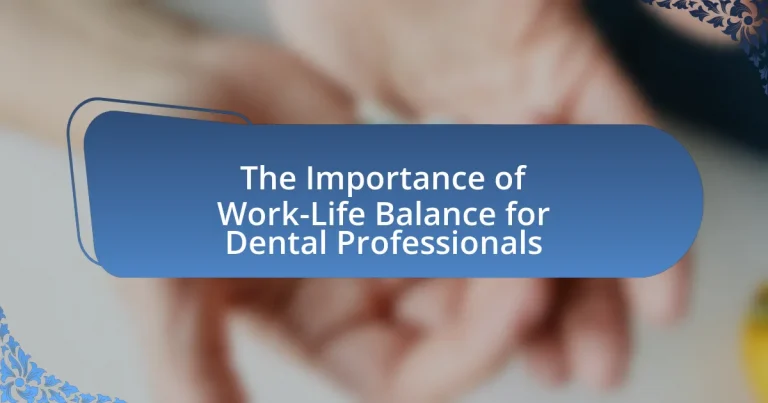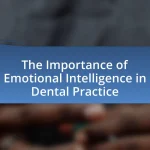Work-life balance is essential for dental professionals, significantly affecting their mental health, job satisfaction, and productivity. High levels of stress and burnout are common in the dental field, with research indicating that a substantial percentage of dentists experience these issues. Effective work-life balance strategies can mitigate these effects, leading to improved well-being and enhanced patient care. The article explores the importance of work-life balance, its impact on mental health and job satisfaction, the consequences of poor balance, and practical strategies for achieving a healthier integration of professional and personal life. Additionally, it highlights the role of workplace culture and leadership in supporting dental professionals’ efforts to maintain this balance.
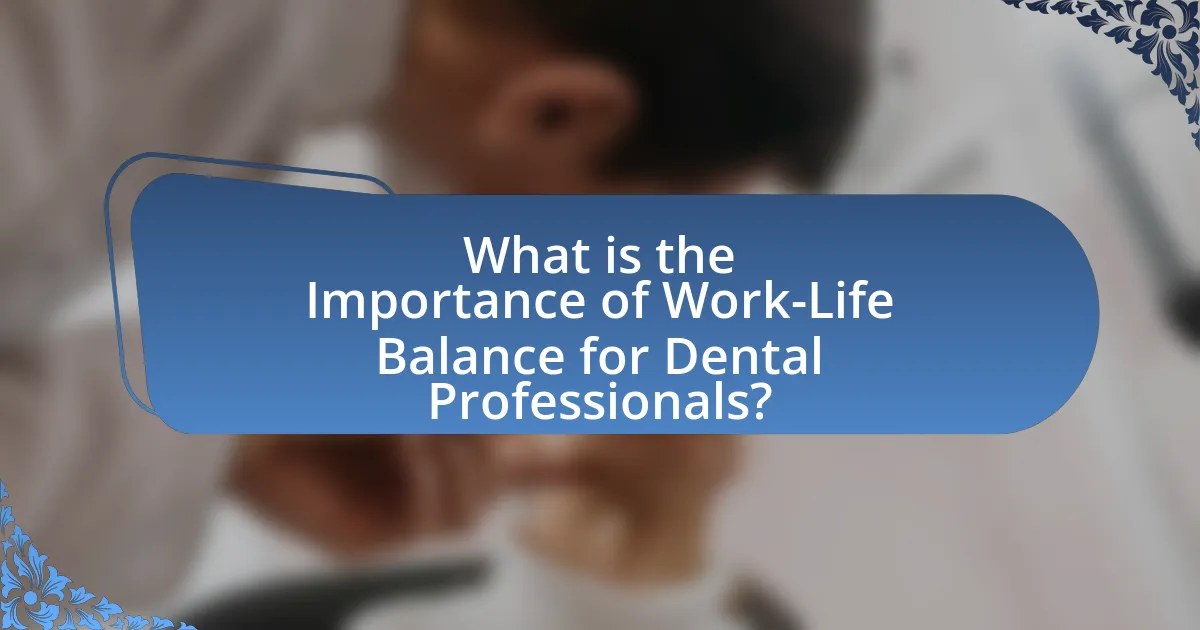
What is the Importance of Work-Life Balance for Dental Professionals?
Work-life balance is crucial for dental professionals as it directly impacts their mental health, job satisfaction, and overall productivity. Maintaining a healthy balance helps reduce stress and burnout, which are prevalent in the dental field due to high patient demands and long working hours. Research indicates that dental professionals who prioritize work-life balance report higher levels of job satisfaction and lower rates of anxiety and depression. For instance, a study published in the Journal of Dental Education found that 40% of dentists experience burnout, highlighting the need for effective work-life balance strategies to enhance their well-being and professional performance.
Why is Work-Life Balance Crucial for Dental Professionals?
Work-life balance is crucial for dental professionals because it directly impacts their mental health, job satisfaction, and overall performance. Research indicates that dental professionals experience high levels of stress and burnout due to the demanding nature of their work, which can lead to decreased productivity and increased turnover rates. A study published in the Journal of Dental Education found that 50% of dentists reported experiencing burnout, highlighting the need for effective work-life balance strategies to mitigate these effects. By maintaining a healthy balance, dental professionals can enhance their well-being, improve patient care, and sustain their careers in the long term.
How does Work-Life Balance impact mental health in dental professionals?
Work-life balance significantly impacts the mental health of dental professionals by reducing stress and preventing burnout. Research indicates that dental professionals often experience high levels of occupational stress due to long hours and demanding patient care, which can lead to anxiety and depression. A study published in the Journal of Dental Education found that improved work-life balance correlates with lower levels of psychological distress among dentists, highlighting the importance of managing work demands alongside personal life. By achieving a better balance, dental professionals can enhance their overall well-being, leading to increased job satisfaction and improved patient care outcomes.
What role does Work-Life Balance play in job satisfaction for dental professionals?
Work-life balance significantly enhances job satisfaction for dental professionals. A balanced approach allows dental practitioners to manage their professional responsibilities while maintaining personal well-being, leading to reduced stress and burnout. Research indicates that dental professionals who prioritize work-life balance report higher levels of job satisfaction, as they can engage more fully in both their work and personal lives. For instance, a study published in the Journal of Dental Education found that 70% of dental professionals who achieved a satisfactory work-life balance expressed greater job satisfaction compared to their counterparts who struggled with this balance. This correlation underscores the importance of work-life balance in fostering a fulfilling career in dentistry.
What are the Consequences of Poor Work-Life Balance in Dentistry?
Poor work-life balance in dentistry leads to increased stress, burnout, and decreased job satisfaction among dental professionals. Research indicates that dentists experiencing high levels of stress are more likely to report symptoms of burnout, which can manifest as emotional exhaustion and depersonalization. A study published in the Journal of Dental Education found that 50% of dental professionals reported feeling overwhelmed by their workload, contributing to mental health issues. Additionally, poor work-life balance can negatively impact patient care, as stressed professionals may exhibit reduced focus and empathy, ultimately affecting treatment outcomes.
How does burnout affect dental professionals?
Burnout significantly affects dental professionals by leading to decreased job satisfaction, increased emotional exhaustion, and reduced quality of patient care. Research indicates that approximately 30% of dentists experience burnout, which can result in higher rates of anxiety and depression among practitioners. This emotional strain often manifests in diminished productivity and a higher likelihood of making clinical errors, ultimately compromising patient safety and care quality. Furthermore, burnout can lead to increased turnover rates within dental practices, exacerbating staffing shortages and impacting overall practice efficiency.
What are the implications of work-related stress on patient care?
Work-related stress negatively impacts patient care by leading to decreased attention, increased errors, and impaired communication among dental professionals. Research indicates that high levels of stress can result in burnout, which diminishes the quality of care provided to patients. For instance, a study published in the Journal of Dental Education found that dental professionals experiencing significant stress reported lower patient satisfaction and higher rates of clinical mistakes. This correlation underscores the importance of addressing work-related stress to enhance patient outcomes and ensure effective care delivery.
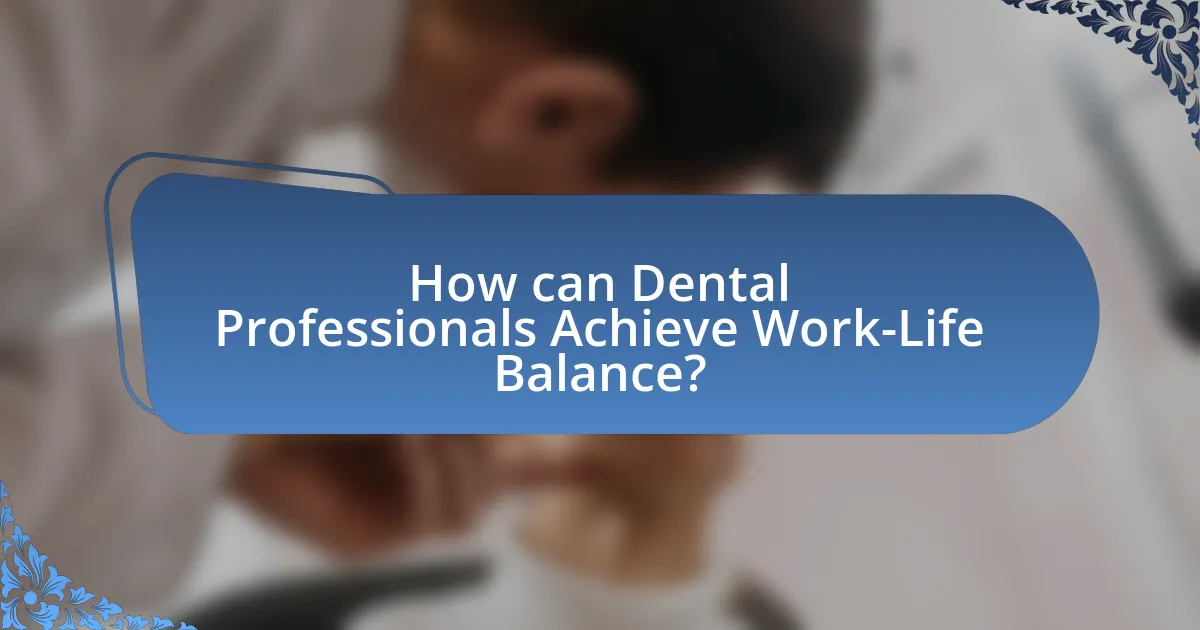
How can Dental Professionals Achieve Work-Life Balance?
Dental professionals can achieve work-life balance by implementing effective time management strategies and setting clear boundaries between work and personal life. Prioritizing tasks, utilizing scheduling tools, and delegating responsibilities can help optimize their workload. Research indicates that dental professionals who maintain a structured schedule report lower stress levels and higher job satisfaction, which is essential for overall well-being. Additionally, engaging in regular self-care activities and seeking support from peers can further enhance their ability to balance professional and personal commitments.
What strategies can dental professionals implement for better Work-Life Balance?
Dental professionals can implement several strategies for better work-life balance, including setting clear boundaries between work and personal time, utilizing time management techniques, and prioritizing self-care. Establishing specific work hours helps to delineate professional responsibilities from personal life, reducing burnout. Time management techniques, such as the Pomodoro Technique, can enhance productivity during work hours, allowing for more free time afterward. Prioritizing self-care activities, such as exercise and hobbies, is essential for mental and physical well-being, which has been shown to improve job satisfaction and overall quality of life. Research indicates that professionals who engage in regular self-care report lower stress levels and higher job satisfaction, reinforcing the importance of these strategies for maintaining a healthy work-life balance.
How can time management improve Work-Life Balance?
Time management can significantly improve work-life balance by allowing individuals to allocate their time effectively between professional responsibilities and personal activities. By prioritizing tasks and setting clear boundaries, dental professionals can reduce stress and prevent burnout, which is crucial in a demanding field. Research indicates that effective time management leads to increased productivity and job satisfaction, as evidenced by a study published in the Journal of Occupational Health Psychology, which found that employees who practiced time management reported lower levels of work-related stress and higher levels of life satisfaction. This structured approach enables dental professionals to fulfill their work obligations while also dedicating time to personal interests and family, ultimately fostering a healthier work-life balance.
What role does setting boundaries play in achieving Work-Life Balance?
Setting boundaries is crucial for achieving work-life balance, as it helps individuals delineate their professional responsibilities from personal time. By establishing clear limits on work hours and availability, dental professionals can reduce stress and prevent burnout, which is particularly important in a demanding field. Research indicates that professionals who set boundaries report higher job satisfaction and improved mental health, leading to enhanced performance and productivity. For instance, a study published in the Journal of Occupational Health Psychology found that employees who maintained work-life boundaries experienced lower levels of emotional exhaustion and greater overall well-being.
How can workplace culture support Work-Life Balance for dental professionals?
Workplace culture can support work-life balance for dental professionals by promoting flexible scheduling and encouraging open communication. Flexible scheduling allows dental professionals to manage their time effectively, accommodating personal commitments while fulfilling work responsibilities. Research indicates that practices with supportive cultures report higher job satisfaction and lower burnout rates among staff, which is crucial in the high-stress dental field. Additionally, fostering an environment where employees feel comfortable discussing their needs and challenges can lead to tailored solutions that enhance work-life balance, ultimately improving overall well-being and productivity.
What initiatives can dental practices adopt to promote Work-Life Balance?
Dental practices can adopt flexible scheduling as a key initiative to promote work-life balance. By allowing staff to choose their working hours or offering part-time positions, practices can accommodate personal commitments and reduce stress. Research indicates that flexible work arrangements lead to higher job satisfaction and lower burnout rates among healthcare professionals, including dentists. Additionally, implementing regular team-building activities and wellness programs can further enhance employee morale and foster a supportive work environment, contributing to overall work-life balance.
How can leadership influence Work-Life Balance in dental settings?
Leadership can significantly influence work-life balance in dental settings by establishing policies that promote flexibility and support for staff well-being. Effective leaders implement scheduling practices that allow for adequate time off and manageable workloads, which directly contribute to reduced stress and burnout among dental professionals. Research indicates that organizations with supportive leadership see a 25% increase in employee satisfaction and a 20% decrease in turnover rates, highlighting the positive impact of leadership on work-life balance. By prioritizing open communication and fostering a culture that values personal time, leaders can create an environment where dental professionals feel empowered to maintain a healthy balance between their work and personal lives.
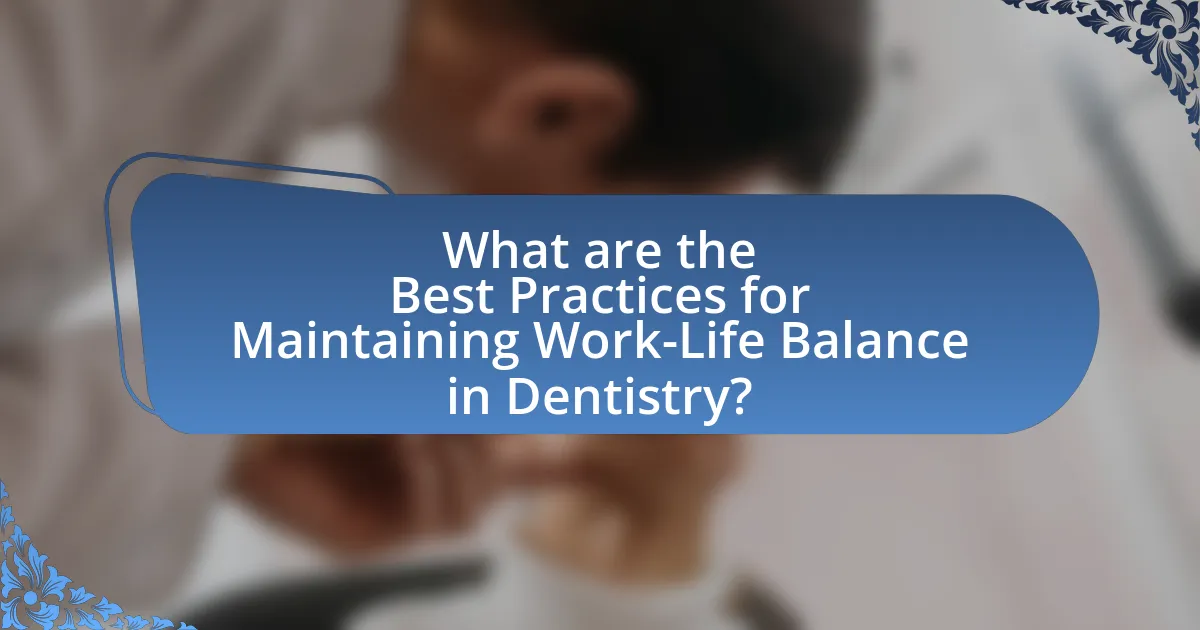
What are the Best Practices for Maintaining Work-Life Balance in Dentistry?
The best practices for maintaining work-life balance in dentistry include setting clear boundaries between work and personal time, prioritizing self-care, and utilizing effective time management strategies. Dental professionals should establish specific work hours and communicate these to patients and staff to prevent work from encroaching on personal life. Prioritizing self-care, such as regular exercise, healthy eating, and adequate sleep, is essential for mental and physical well-being, which directly impacts job performance. Effective time management techniques, such as scheduling breaks and delegating tasks, can help dental professionals manage their workload efficiently. Research indicates that maintaining a healthy work-life balance can lead to reduced burnout and increased job satisfaction among dental practitioners, as highlighted in studies published in the Journal of Dental Education.
What daily habits can dental professionals adopt for better Work-Life Balance?
Dental professionals can adopt daily habits such as setting clear boundaries between work and personal time, prioritizing self-care, and scheduling regular breaks to enhance their work-life balance. Establishing specific work hours helps prevent burnout by ensuring that personal time is respected and utilized effectively. Engaging in self-care activities, such as exercise or mindfulness practices, contributes to mental and physical well-being, which is crucial in a high-stress profession like dentistry. Additionally, taking short breaks throughout the day can improve focus and productivity, allowing dental professionals to manage their workload more efficiently. These habits are supported by research indicating that structured work-life balance practices lead to increased job satisfaction and reduced stress levels among healthcare providers.
How can mindfulness practices contribute to Work-Life Balance?
Mindfulness practices can significantly enhance work-life balance by promoting stress reduction and improving focus. Engaging in mindfulness techniques, such as meditation and deep-breathing exercises, has been shown to lower cortisol levels, which are associated with stress. A study published in the Journal of Occupational Health Psychology found that employees who practiced mindfulness reported a 32% reduction in stress and a 25% increase in job satisfaction. This reduction in stress allows dental professionals to manage their work responsibilities more effectively while maintaining personal well-being, leading to a healthier balance between their professional and personal lives.
What role does physical health play in maintaining Work-Life Balance?
Physical health is crucial for maintaining work-life balance as it directly influences energy levels, stress management, and overall productivity. When dental professionals prioritize their physical health through regular exercise, proper nutrition, and adequate rest, they experience improved mental clarity and resilience against job-related stressors. Research indicates that individuals who engage in physical activity report lower levels of stress and higher job satisfaction, which are essential for achieving a harmonious work-life balance. For instance, a study published in the Journal of Occupational Health Psychology found that regular physical activity significantly reduces burnout and enhances work engagement among healthcare workers. Thus, maintaining physical health is integral to achieving a sustainable work-life balance for dental professionals.
What resources are available for dental professionals seeking Work-Life Balance?
Dental professionals seeking work-life balance can access various resources, including professional organizations, wellness programs, and time management tools. Organizations such as the American Dental Association (ADA) offer resources focused on mental health and stress management, providing webinars and articles that address work-life balance challenges specific to dental practice. Additionally, wellness programs tailored for dental professionals often include stress reduction workshops and peer support groups, which can enhance emotional well-being. Time management tools, such as scheduling software and productivity apps, help dental professionals optimize their work hours, allowing for more personal time. These resources collectively support dental professionals in achieving a healthier work-life balance.
How can professional organizations assist in promoting Work-Life Balance?
Professional organizations can assist in promoting work-life balance by providing resources, support, and advocacy for policies that prioritize employee well-being. These organizations often offer training programs that educate dental professionals on time management and stress reduction techniques, which can lead to improved work-life integration. Additionally, they can advocate for flexible work arrangements and policies that support mental health, such as access to counseling services. Research indicates that organizations that promote work-life balance can enhance job satisfaction and reduce burnout, which is particularly relevant in high-stress fields like dentistry. For example, a study published in the Journal of Occupational Health Psychology found that employees with better work-life balance reported higher levels of job satisfaction and lower levels of stress.
What online tools can help dental professionals manage their time effectively?
Dental professionals can effectively manage their time using online tools such as Dentrix, Open Dental, and Zocdoc. Dentrix offers comprehensive practice management features, including scheduling, billing, and patient communication, which streamline daily operations. Open Dental is an open-source software that allows customization and integration with various applications, enhancing workflow efficiency. Zocdoc facilitates appointment booking and patient management, reducing administrative burdens and improving patient flow. These tools collectively contribute to better time management, allowing dental professionals to focus more on patient care and less on administrative tasks.
What are practical tips for dental professionals to enhance their Work-Life Balance?
Dental professionals can enhance their work-life balance by implementing structured scheduling, setting clear boundaries, and prioritizing self-care. Structured scheduling allows dental professionals to allocate specific times for work and personal activities, reducing overlap and stress. Setting clear boundaries, such as designated work hours and limiting after-hours communication, helps maintain a separation between professional and personal life. Prioritizing self-care, including regular exercise, healthy eating, and sufficient sleep, contributes to overall well-being and resilience against work-related stress. Research indicates that professionals who engage in self-care practices report higher job satisfaction and lower burnout rates, reinforcing the importance of these strategies for maintaining a healthy work-life balance.
